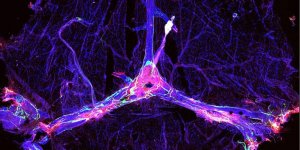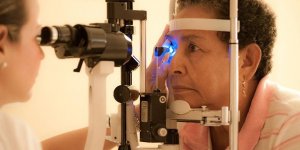Health News

Study in mice suggests lymphatic boost could help reduce amyloid buildup. »

Scientists at the University of Cambridge have shown in animal studies that (...) »

Cells called astrocytes can independently promote longer or deeper sleep in mice. »

In a study of mice, treatment with the engineered cells shrank tumors and prevented the cancer from spreading to other parts of the body. »

An international team of scientists has found evidence that SARS-CoV-2, the virus that causes COVID-19, infects cells in the mouth. »

Scientists reveal mechanism behind one of humankind's most deadly processes. »

Scientists find post-infection changes in skin microbiome of the mountain yellow-legged frog. »

Microbes in sediment below the seafloor are sustained primarily by chemicals created by the natural irradiation of water molecules, report researchers at the University of Rhode Island and their collaborators. »

Having children at least three years apart can help prevent stunting in children, says a study carried out in India. »

A study of spatial learning in mice shows that exposure to new experiences dampens established representations in the brain’s (...) »

Study identifies cardiovascular risk factors that may lead to pregnancy problems for first-time moms
A new study of first-time pregnant women found risk factors for heart disease (...) »

A team of engineers has identified the ‘violent’ physical processes at (...) »

Engineers and oncologists teamed to develop a microfluidic chip. »

A team of researchers studying the effectiveness of different types of face masks has found that (...) »

A new study has identified early risk factors that predicted heightened anxiety in young adults during the coronavirus (COVID-19) pandemic. »

Masks help protect the people wearing them from getting or spreading SARS-CoV-2, the virus that causes COVID-19, but now (...) »

Scientists have made a ‘vital step’ towards understanding the origins of Parkinson’s disease – the fastest growing neurological condition in the world. »

Understanding regulation of gene expression may help with new therapeutic approaches that target RNA. »

Potentially deadly cases of diarrhoea and pneumonia among young children can be greatly reduced, a study found, when basic hygiene messages are delivered through drama and song. »

Researchers identify viral protein sequences that could inform therapeutic design. »

Global greenhouse gas emissions over the last century have made southern China a hotspot for (...) »

Naturally produced by the body, hyaluronan represents a new class of biologic that significantly improves lung health in patients with severe COPD. »

The earliest eye damage from prion disease takes place in the cone photoreceptor cells (...) »

For nearly 20 Percent of children diagnosed with autism spectrum disorder, the origins of their distinct mix of behavioral (...) »

Insufficient sleep decreases brain wave activity associated with cognition. »

Contrary to previous findings, low-dose aspirin therapy before conception and during early pregnancy may increase pregnancy chances and live births among women who have experienced one or two prior miscarriages. »

In large clinical trial conducted worldwide, full dose anti-coagulation treatments given to moderately (...) »

Researchers have shown that living near an abundance of green vegetation can offset the negative effects of air pollution on blood vessel health. »

New research provides important insights into the role played by the immune system in preventing – and in some cases increasing the severity of – COVID-19 symptoms in patients. »

Researchers from the National Institutes of Health have discovered Jekyll and Hyde immune cells in the brain that ultimately help with brain repair but early after injury can lead to fatal swelling, suggesting that timing may be critical when administering treatment. »

Nearly 30 per cent of pregnancy losses in South Asia blamed on polluted air. »

Researchers have developed a DNA test to quickly identify secondary infections in COVID-19 patients, who have double the risk of developing pneumonia while on ventilation than non-COVID-19 patients. »

Salmonella enterica serovar Typhimurium bacteria commonly cause human gastroenteritis, inflammation of the lining (...) »

Taurine, which helps the body digest fats and oils, could offer treatment benefit. »

Researchers have used machine learning techniques to predict how proteins (...) »

Women who use marijuana could have a more difficult time conceiving a child than women who do not use marijuana, suggests a study by researchers at the National Institutes of Health. »

A new study has identified key genetic changes in SARS-CoV-2 that may be responsible for the jump from bats to humans. »

Very low birthweight infants often need blood transfusions to survive. A study suggests that providing a higher threshold of red cells within accepted limits (...) »

Results from a study of 19 deceased patients suggests brain damage is a byproduct of a patient’s illness. »

Psoriasis, a chronic inflammatory skin disease, has long been known to increase the risk of cardiovascular disease, which includes heart attack and stroke. »

A new method for visualizing breath that is exhaled while someone is speaking or singing could provide important new insights into how diseases such as COVID-19 spread and the effectiveness of face masks. »

Children who undergo cataract surgery as infants have a 22% risk of glaucoma 10 years later, whether or not they receive an intraocular lens implant. »

Researchers at the National Eye Institute report that a brain region in the superior temporal sulcus is crucial for processing and making decisions about visual information. »

Injecting a gene therapy vector into one eye of someone suffering from LHON, the most common cause of mitochondrial blindness, significantly improves vision in both eyes, scientists have found. »

A study has made a surprising connection between frontotemporal dementia and amyotrophic lateral sclerosis, two disorders of the nervous system, and the genetic mutation normally understood to cause Huntington’s disease. »

Researchers have identified the process that causes the skin and other human organs to age, in what could prove a major breakthrough for the field of regenerative medicine. »

Researchers demonstrated in older men that the makeup of a person's gut microbiome is linked to their levels of active vitamin D, a hormone important for bone health and immunity. »

A new study suggests about 30-40 minutes per day of building up a sweat should be enough to counteract the negative health impact of a day at a desk. »

Leveraging public data reveals new information about genetic alterations and their roles in cancer. »

Researchers at the University of California San Diego have identified new Alzheimer's disease mechanisms in neurons. »
